OOP’s 2025 Healthcare AI Hackathon Projects
Get Out-Of-Pocket in your email
Looking to hire the best talent in healthcare? Check out the OOP Talent Collective - where vetted candidates are looking for their next gig. Learn more here or check it out yourself.
 Hire from the Out-Of-Pocket talent collective
Hire from the Out-Of-Pocket talent collectiveHealthcare 101 Crash Course
%2520(1).gif)
Featured Jobs
Finance Associate - Spark Advisors
- Spark Advisors helps seniors enroll in Medicare and understand their benefits by monitoring coverage, figuring out the right benefits, and deal with insurance issues. They're hiring a finance associate.
- firsthand is building technology and services to dramatically change the lives of those with serious mental illness who have fallen through the gaps in the safety net. They are hiring a data engineer to build first of its kind infrastructure to empower their peer-led care team.
- J2 Health brings together best in class data and purpose built software to enable healthcare organizations to optimize provider network performance. They're hiring a data scientist.
Looking for a job in health tech? Check out the other awesome healthcare jobs on the job board + give your preferences to get alerted to new postings.
Hackathon is Backathon…Boo this man
We just wrapped up our AI healthcare hackathon in SF. Some quick observations before we go into the projects.
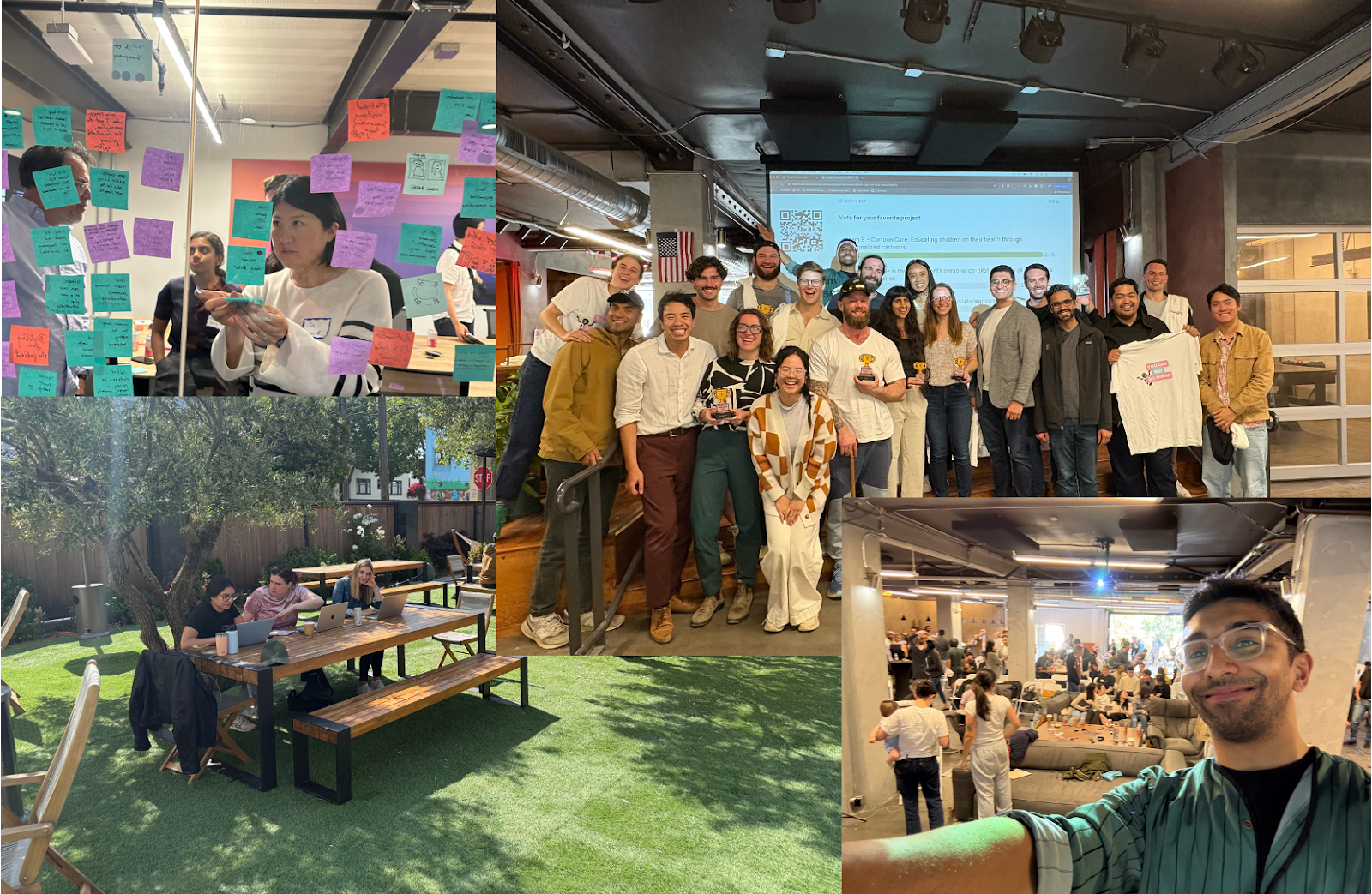
- It’s insane how much has changed compared to last year. In 2024 at the hackathon, you basically only had the foundation models and they just learned “reasoning”. This year there’s an entire ecosystem of AI agents, voice companies, healthcare specific models, image generation, etc.
- I heard a lot of really weird ideas in the brainstorm that I hope get built later. Prediction markets for patient outcomes, spiritual assistance for nursing home residents, things got crazy.
- In the first hackathon, so much was about getting the models to try and do one thing well. In this hackathon, it’s clear that it was much more about stitching together a bunch of different tools together to do interesting things
- SF’s entire billboard economy is being supported by genAI. There’s even counter AI ads now.
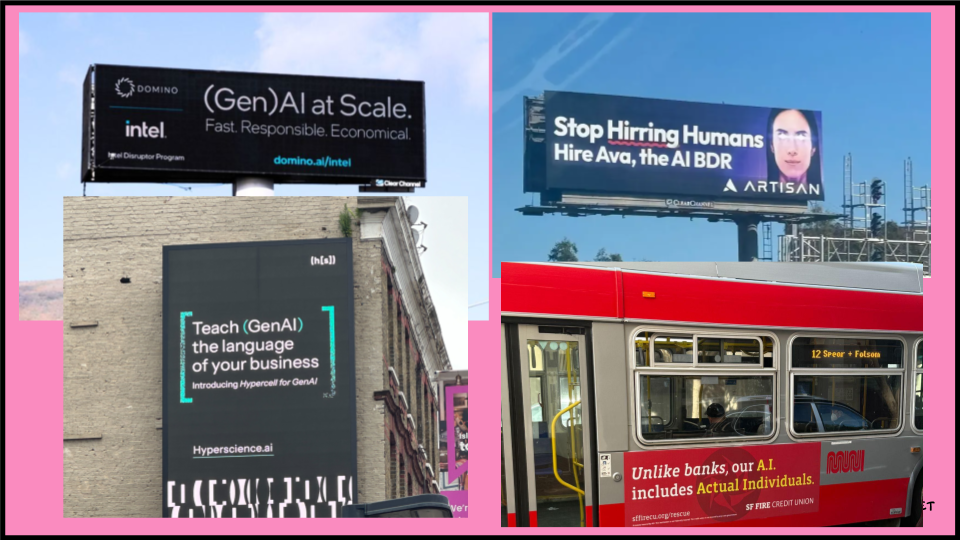
- We took a poll last year and this year to get a sense of how people used AI. In year 1, about 10-20% of people had used ChatGPT/Claude, etc. This year the familiarity was way higher, basically everyone has been using it in their regular life. There’s also a ton more you can do as a non-technical person. There is no longer an excuse for not trying these tools out. People were using Replit, Retell, ChatGPT, lovable, etc. to do some crazy stuff without any engineering experience. We even built our own tool.
- About 10-15% of hackers this year were clinical. One of my goals with these hackathons is just getting clinical people playing around with these new tools, because I think they can build more themselves today.
- You can…really get virtually any swag made. The only limits are your own creativity and your speed in ordering everything before tariffs hit.
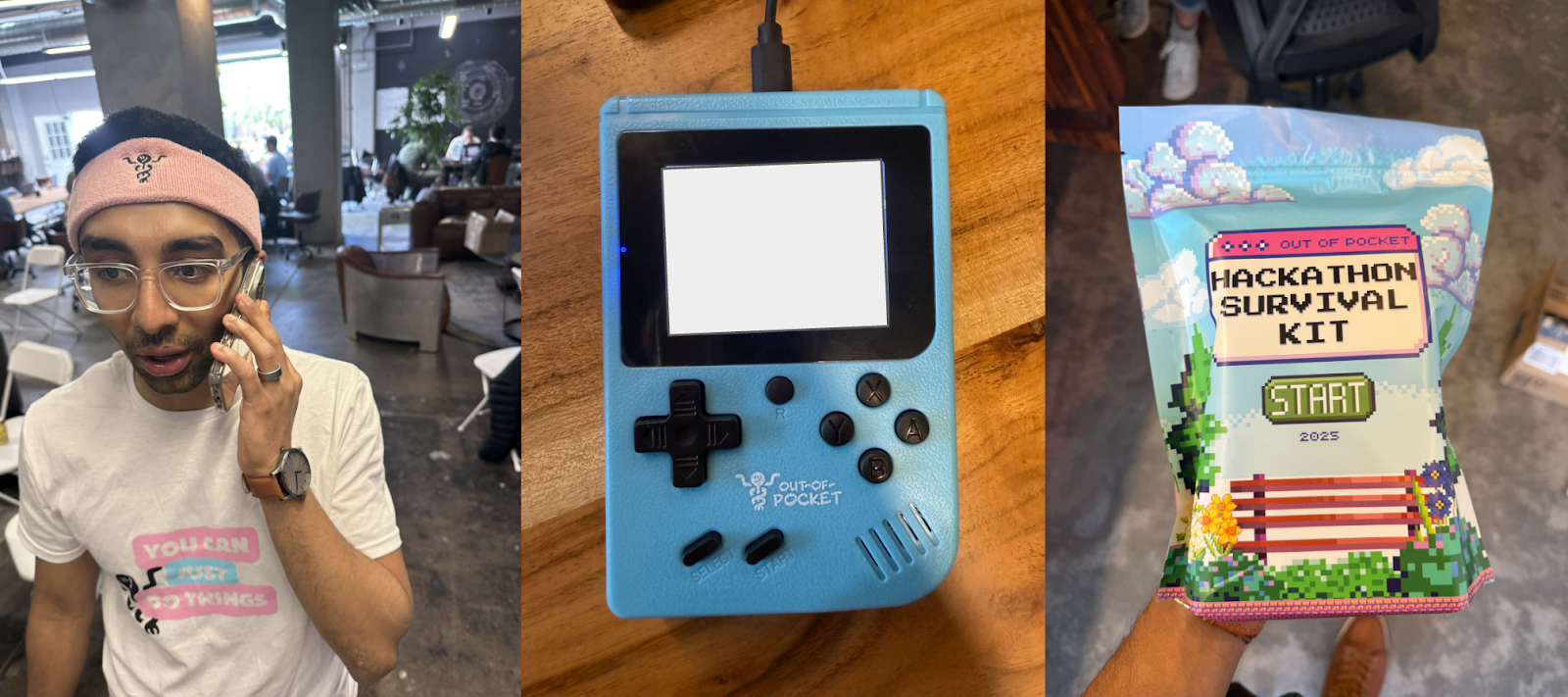
Below you’ll find the projects that people built. I want to stress that:
- Virtually none of the teams knew each other before coming, we paired them all up
- None of them came with a prebuilt idea, everything was made from scratch in 36 hours including the user interfaces
- Your body is a machine that can turn coffee and anxiety into prototype grade apps with the tools today
- If you want to hear about attending or being on a team in future hackathons, sign up here
I highly recommend taking a look at what’s possible because they might inspire you to try some of these at your job. And don’t be shy to reach out to the teams!
Copi - Copilot For New Parents
***Winner of the “I’m using this tomorrow” award - the most practical application and 2nd place People’s Choice
Team: Nitya Kanuri, Benjamin Danek, David Freed
Contact Information:
Project: Data about my child’s health is spread across multiple platforms - Nara (tracking app), multiple providers’ EMRs and AVSs, a shared photo album, text threads with my partner and nanny, and hard copies in our closet. The only way to derive value from these data (e.g., personalizing care, preempting rising risk) is by consolidating, and the only way to create ‘one source of truth’ is through passive ingestion.
Copi is every new parent's co-pilot who passively ingests your child's health info - from texts, WhatsApp, photos, videos - to create a digital twin that guides your child's care.
Illustrative user experience: My son has a new rash. I text a photo to a “Baby Care” text thread, on which Copi is a participant. Copi suggests it looks mild and we should start by applying OTC ointment and monitoring for 24 hours. Copi adds the timestamped photo to my son’s profile as an “event.” Copi reaches out in 24 hours for an update.
Key features: Up-to-date kid profile and event timeline, passive data ingestion across various platforms and mediums, context-aware guidance when prompted, proactive reminders
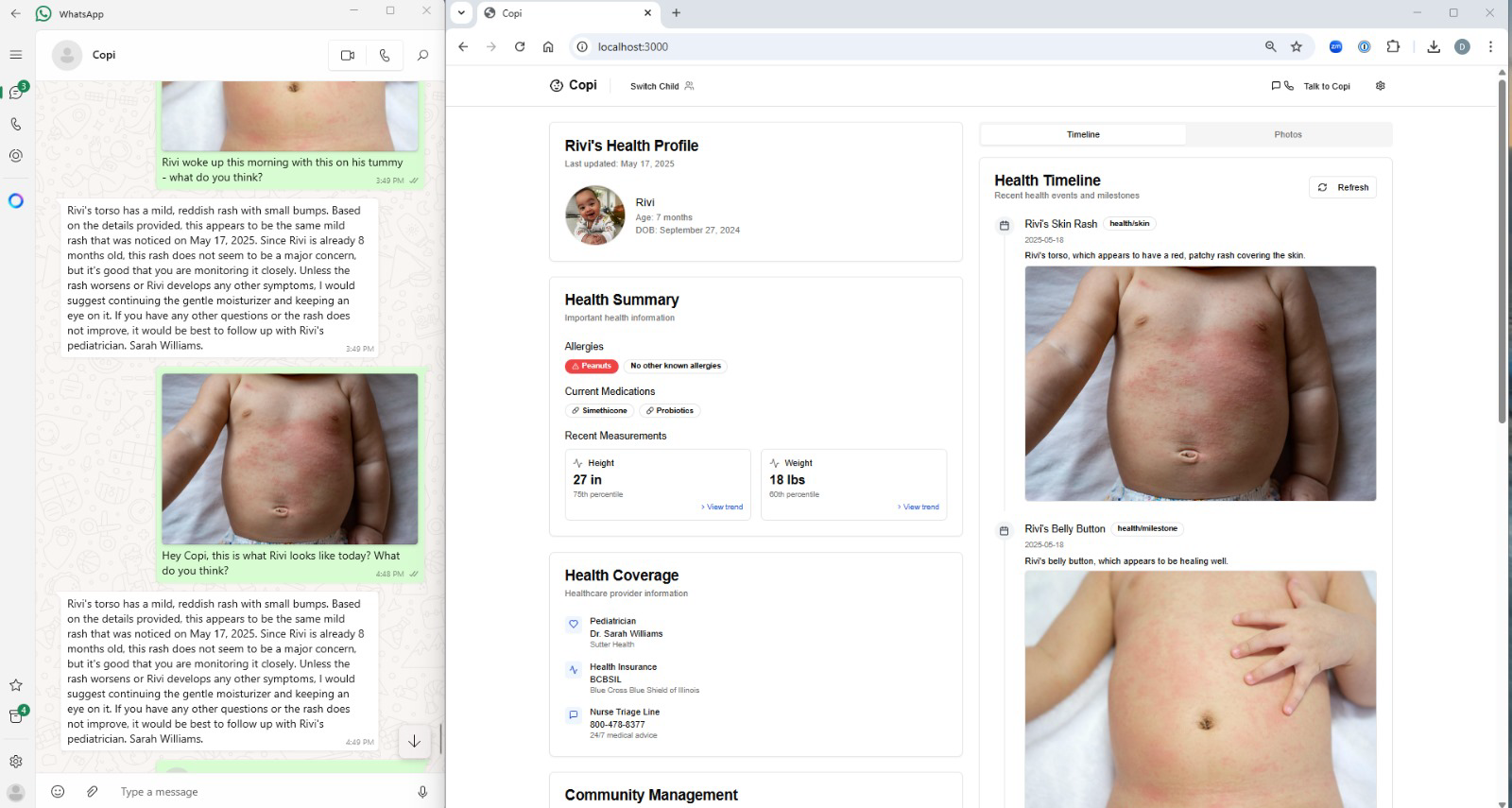
Live Demo: Watch Here
[NK note: I have lots of friends with newborn kids - and the whole process of caring for a newborn seems honestly terrifying. These kids are speedrunning the entire history of the darwinian evolution to the modern immune system in the first year.
The really nifty part about this project is that it uses Whatsapp as the main interface and fits right into the parents regular workflow. Just make sure you’re not sending these pictures to the family chat by accident. The FBI is gonna put all of them on lists when the pictures autosave on their phone.
On the back-end it parsed out the relevant pieces into the right places, has a nice timeline flow, etc. In general a really seamless user interface/user experience, shocked that this was doable in such a short period of time.]
GrumpyNurse - Referral Coordinator Between Visits
Team: Minal Shah, Doug Fair, Evan Estola, William Pang
Project: Referrals suck. The act of faxing, processing, fixing, and finally scheduling referrals leave PCPs and Specialists frustrated and patients left in the dark. Often the only savior in this hellscape process is a highly competent nurse unblocking processes and advocating for patients.
GrumpyNurse is a referral coordinator inspired by the efficient nurses that keep our healthcare system running.
GrumpyNurse analyzes new referrals against specialist institutional and individual preferences. It then requests and collects missing information all while keeping the patient, referring provider, and specialist informed via a group chat interface.
Once the referral is confirmed, GrumpyNurse assists with the last mile - scheduling and preparing the patient. Most importantly, every step of the way is translated to patients in their own language, serving to light their way like so many nurses do today.
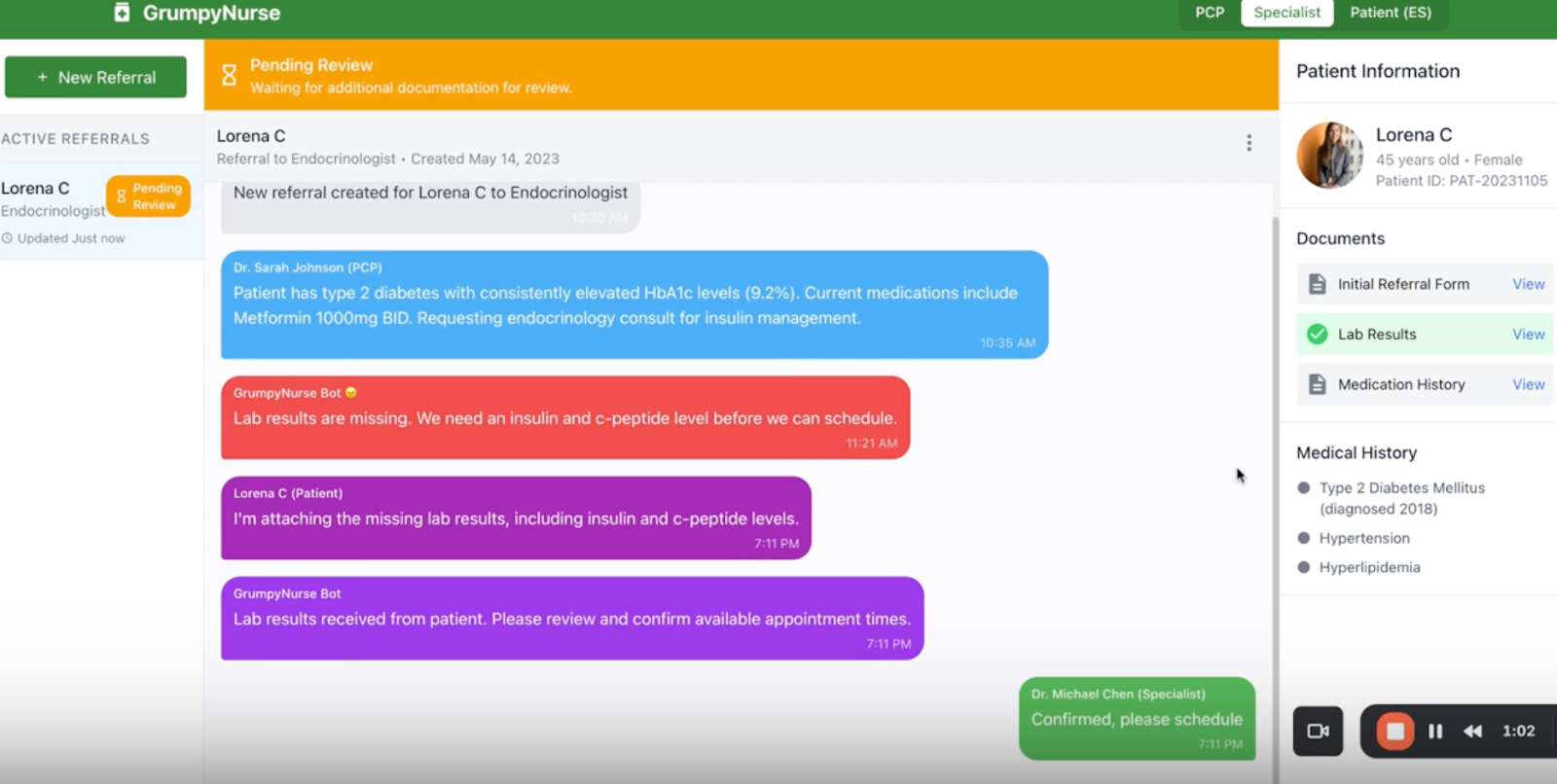
Live Demo: Watch Here
Recorded Demo: Watch Here
[NK note: It’s true, the healthcare system is held together by Grumpy Nurses who DGAF and just need things to get done. Big respect.
The interstitial between when a referral gets made and when you actually see the next physician is a massive gap. So much falls through the cracks and there’s a lot of things that can be ordered/done during that time to make the specialist visit more useful for all parties involved.
I think more things in healthcare would be solved if we had bot-mediated group chats. Put the pcp and specialist in one chat. Put the payer rep and doc in a group chat. Put my boyz and a therapist in a group chat. Let the bot guide us on what to do.]
Cartoon Care - Personalized Storybooks for Pediatrics
**Winner of 1st Place People’s Choice and Most Fun - Project That Put A Smile On Your Face
Team: Tom Nork, Naciima Mohamed, Joe Cohen
Follow Up Contacts:
- naciima@agate.health
- joe@agate.health
- thomasedwardnork@gmail.com
Project: Cartoon Care is an AI-powered platform that creates personalized storybooks to help children ages 5–11 understand their medical conditions and care experiences. Each book features the child as the main character, surrounded by supportive doctors, nurses, and family, turning complex medical journeys into empowering, age-appropriate adventures.
Using just a few details—like the child’s name, age, condition, and a photo—Cartoon Care generates beautifully illustrated, custom storybooks in minutes. These stories provide comfort, clarity, and courage, helping families and providers communicate more openly and compassionately about health challenges.
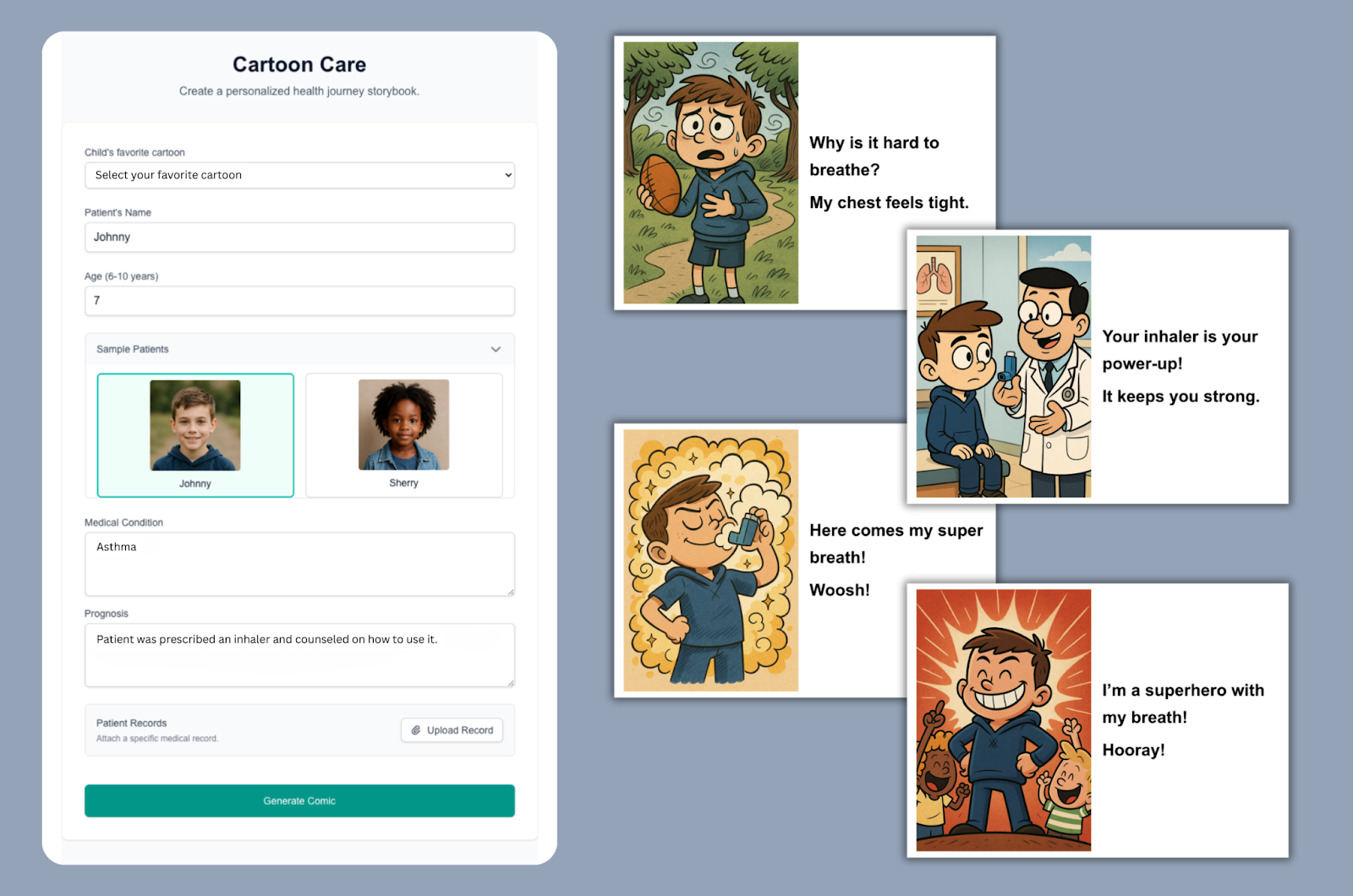
Live Demo: Watch Here
Recorded Demo: Watch Here
[NK note: Lol okay this team literally took a picture of me 3 hours before the demo, used their tool, and printed out a physical book about my flu journey. It even has the same, vaguely baseball/bowler themed fit I had going on (it’s fashion, look it up).
I thought this was fantastic. I’m just amazed at how far the image and video generation has come - this shows the optimistic ways we can use hyper personalized content to help people. And I love that it’s just so fun!]
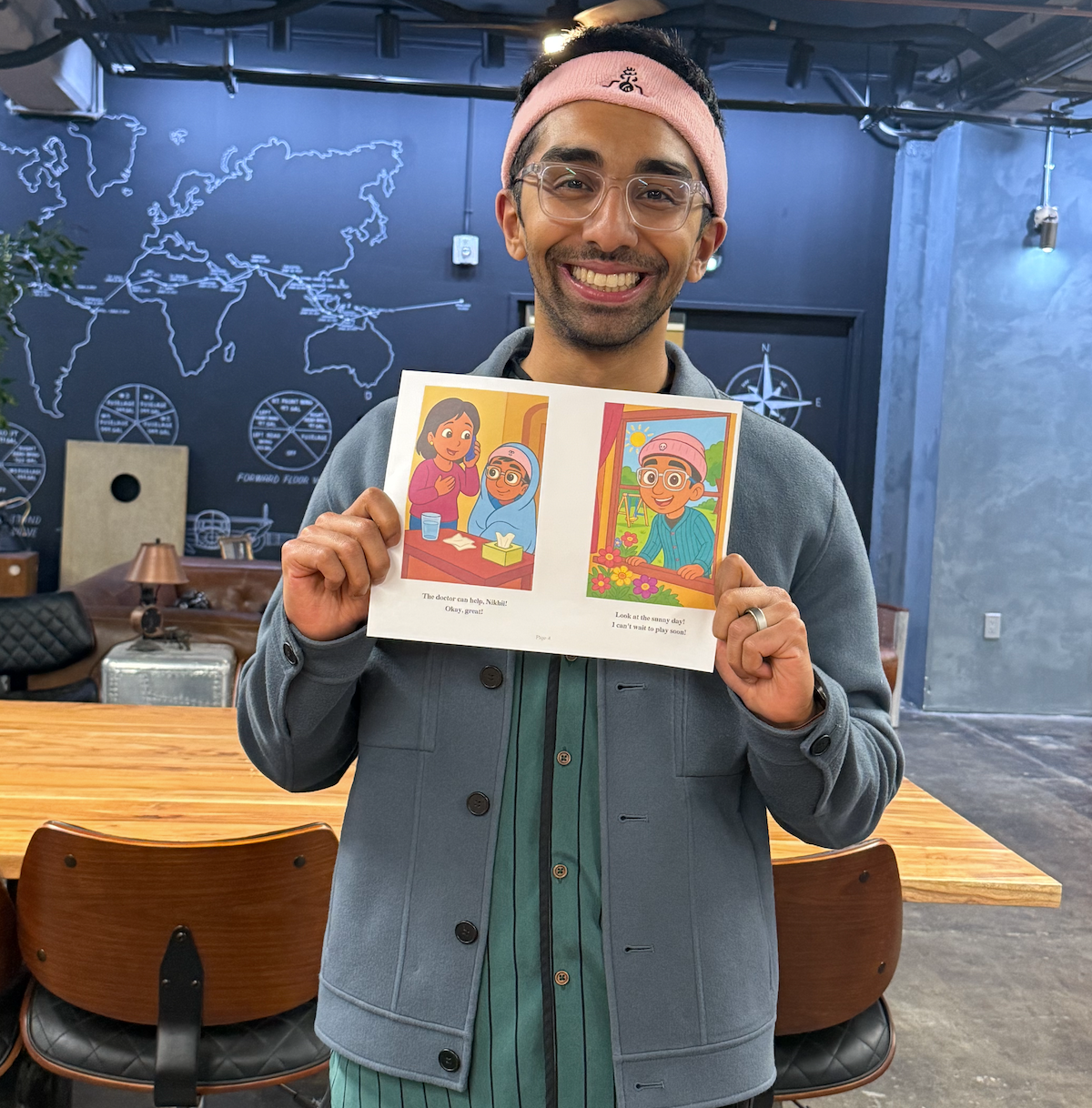
LLM Course Enrollment Ends This Week!
Team: Out-Of-Pocket
Contact info: sales@outofpocket.health
Project: Large Language Models in healthcare 101
Do all these projects suddenly make you excited to see what it would be like to deploy LLMs in healthcare today? Well boy do we have a course for you!
We’ll talk about what they can do well today, what they can’t, compliance stuff you need to care about, and the practicalities of going from one of these prototypes to actual implementation. Sign up ends this week!
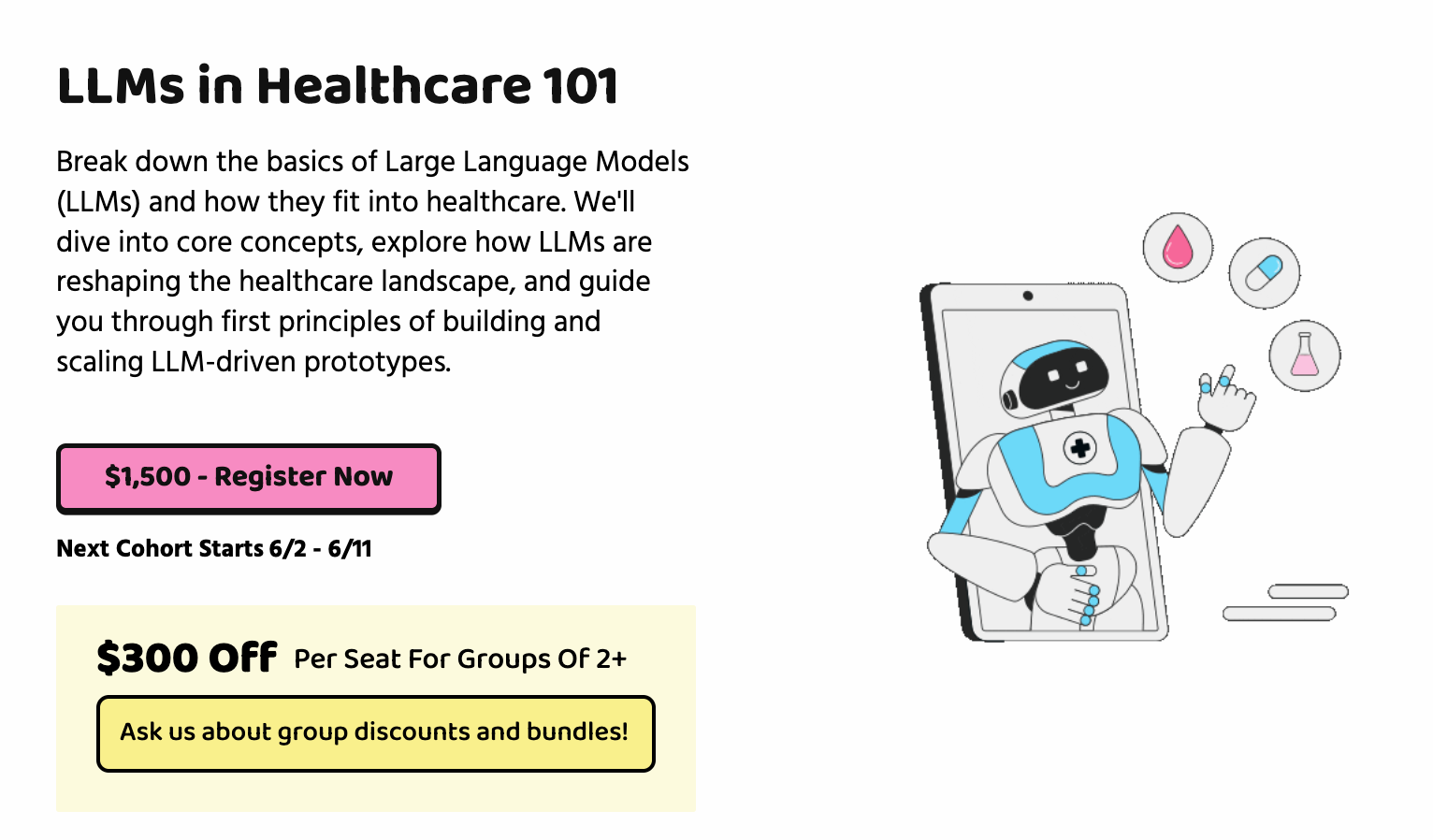
[NK Note: Wow Out-Of-Pocket sure does great native advertising. I wonder if the LLM course will be as good as their upcoming Healthcare 101 course taught by Nikhil starting on 6/24. I heard it goes over all the main stakeholders in healthcare, how the money moves, and the basic laws in the span of 3 weeks.]
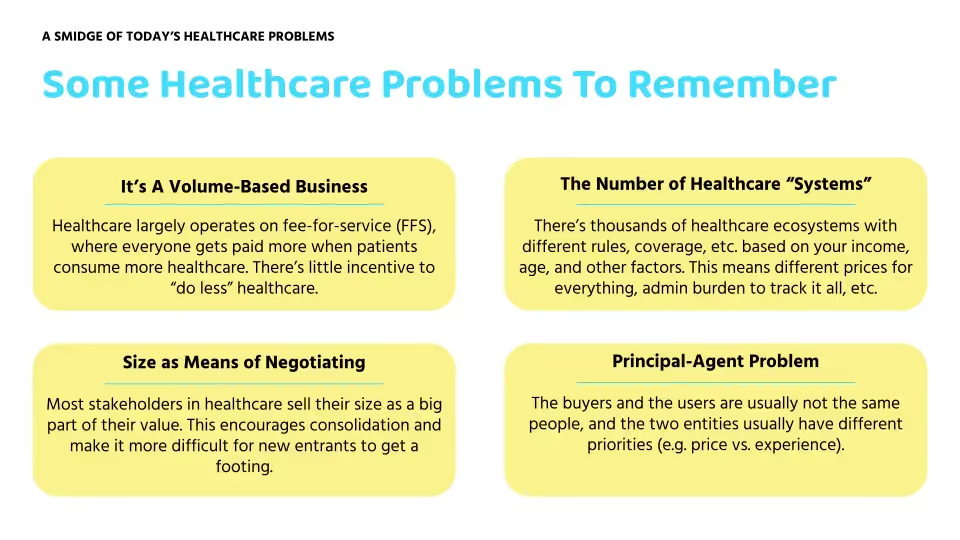
Code Blue Co-pilot - Documenting and Assisting A Cardiac Arrest
***Third Place Winner for People’s Choice
Team: Kayla Bassett, PA-C, Niki Pham, BSN, RN, CCRN, Cameron Breze, Chien Ho,
In a hospital, Cardiac Arrests are stressful, chaotic, and require a team of 8-15 people. One designated “recorder” is responsible for documenting meticulous details of every intervention taken (medication, intubation, compressions, pulse check, shocks, etc.). Assuming this role is notoriously difficult and stressful, leading to poor documentation and accuracy.
Code Blue Co-pilot is a voice-to-text replacement of the “recorder” role during an inpatient Cardiac Arrest. It listens and transcribes, gives clinically informed audio feedback in real time reminders based on key events (ie. "X time until next pulse check") then synthesizes the transcription to create a report mapped against current AHA ACLS guidelines with actionable insights. If deployed, Code Blue Co-pilot could decrease documentation errors, legal exposure, and code-related staffing costs while improving regulatory compliance patient outcomes.
Please reach out to anyone on the team if you want to help us bring this to life, or just want to chat about it!
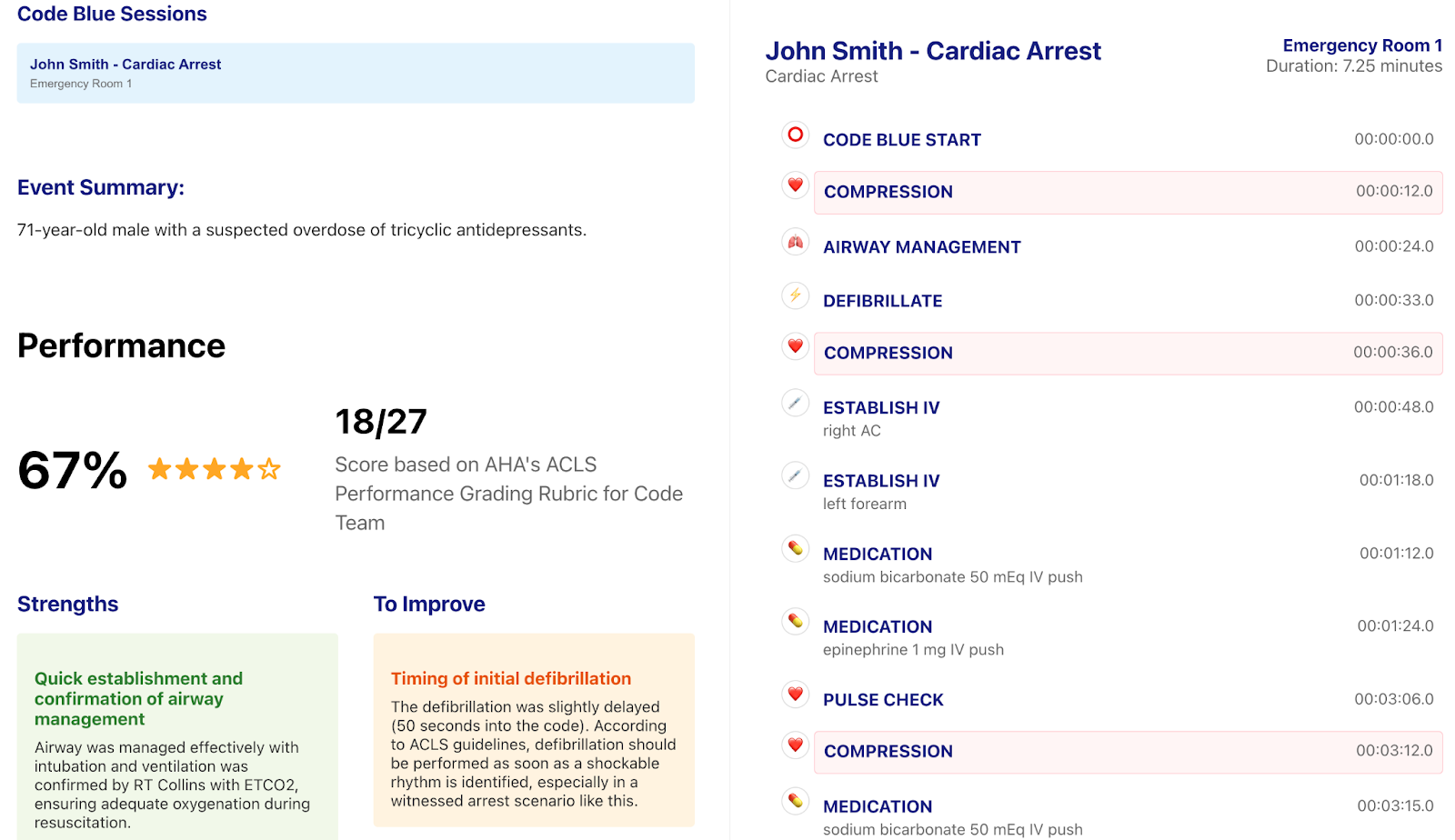
Live Demo: Watch Here
[NK note: Lol everyone in this group needs to be on IMDb for their acting skills (highly recommend watching the live demo). I loved this project because it came from a very niche pain point that clinical members of the team experienced.
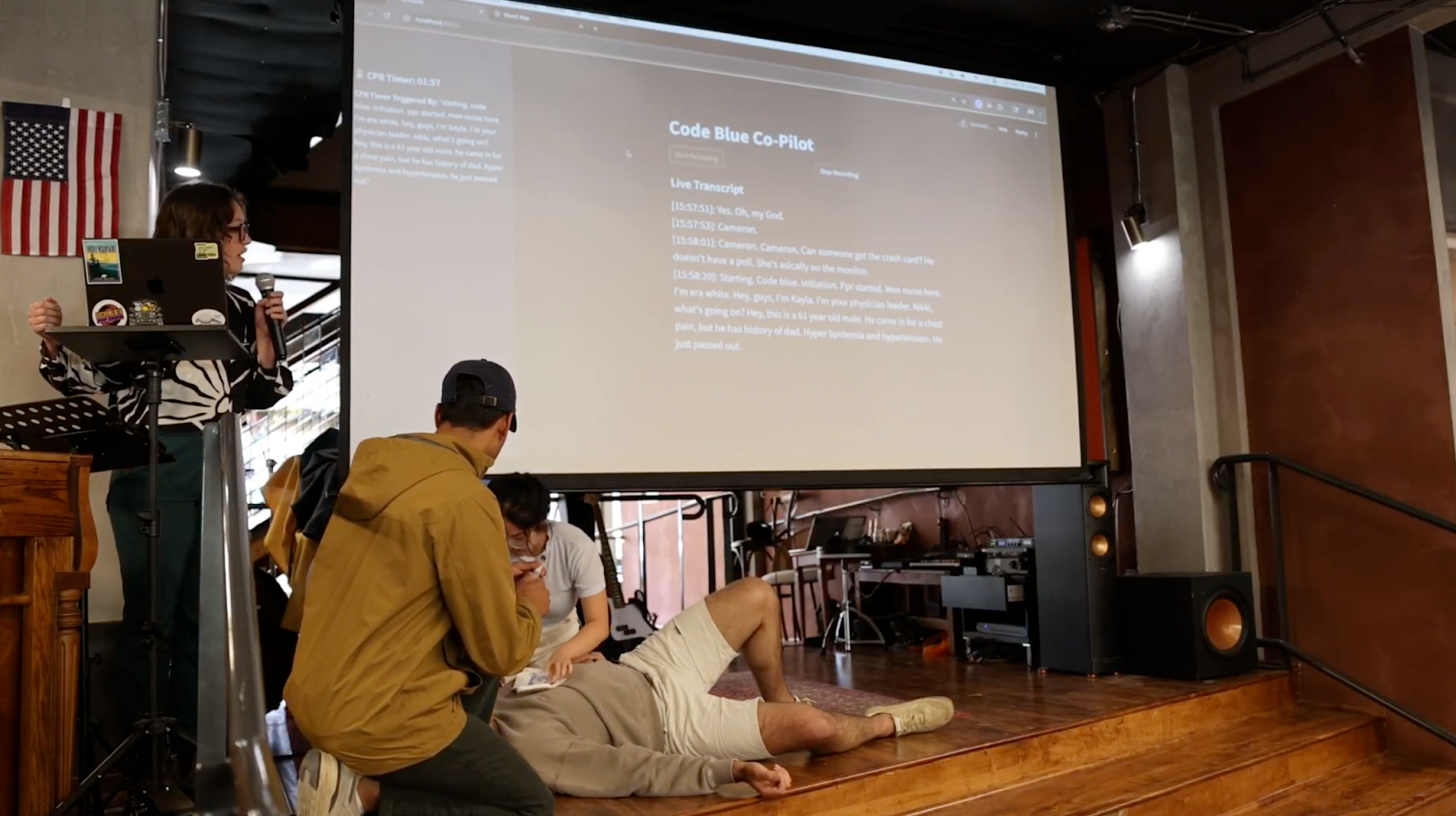
I also think this actually does a few very difficult things! Picking up on who’s speaking when everyone is yelling, figuring out what’s being said, and capturing the documentation needed. On top of that, this is an area where latency really matters - and it’s clear the models have gotten a million times better on this front.
This project gives a glimpse into what it looks like where an AI is giving next steps to whoever has the “hands on the body” of the patient, which is probably where healthcare is moving]
Clara - The Dementia Assistant
Team: Khushi Chawla, Nao Hoshiya, Nathan Kenney, Perbhat Kumar
Contact info: clara.dementiaai@gmail.com
Clara is an AI-powered assistant designed to help caregivers support loved ones living with dementia. When a patient enters a memory loop or the caregiver is unavailable, Clara gently steps in—engaging the patient in familiar, comforting conversation that mimics the caregiver’s tone and style. By maintaining routine and emotional connection, Clara offers reassurance and continuity when it’s needed most.
Clara integrates seamlessly with the patient’s iMessage, enabling natural-feeling chat and call interactions without requiring new technology. Through the caregiver-facing app, caregivers can easily toggle between engaging with the patient themselves or allowing Clara to step in—making it possible to take breaks, attend to other needs, or rest without guilt, while knowing their loved one is still supported.
Live Demo: Watch Here
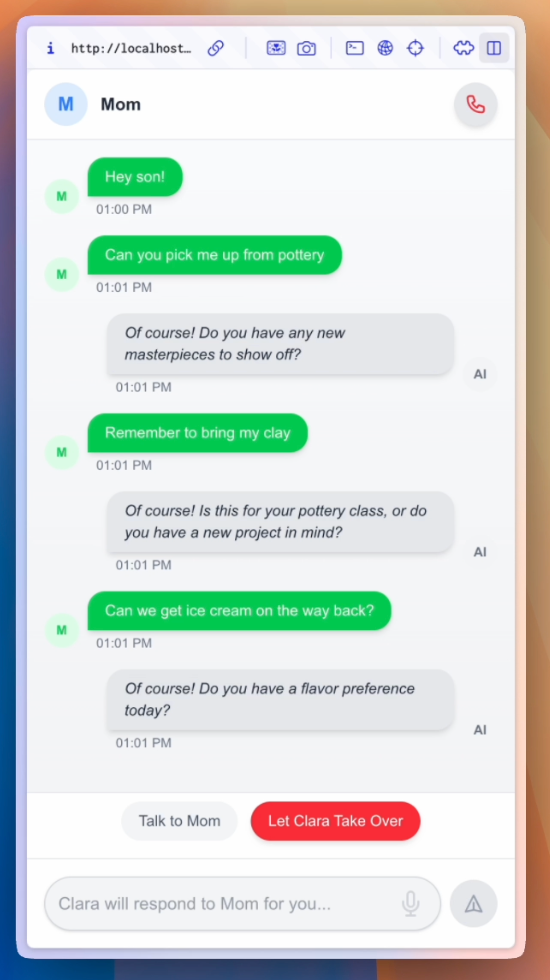
[NK note: I thought this concept was really cool and there was a lot of really interesting discussion around bot ethics after this. If I’m talking to someone that’s using a bot to respond, should I be made aware? Is that true for something like auto complete?
Also there’s always going to be a tension between providing round the clock support to high needs patients and also giving caregivers relief. I think this project really brought that tension to the front and center.]
ARC - your Automated Referral Center agent
Team: Krishna Adithya Venkatesh, Deb Dab, Vrain Ahuja, Alok Singh, Prashant Mantripragada
Contact Info: krishnavadithya@gmail.com, debdab@gmail.com, vrain@hey.com , alokshishir@gmail.com, prashant.mantripragada@gmail.com
Project: Automated Referral Center (ARC) is designed to address one of healthcare’s most persistent operational pain points: the inefficiencies and breakdowns in the patient referral process. ARC utilizes AI-driven automation to eliminate manual, multi-day, and error-prone steps in the referral workflow, transforming it into an instant, closed-loop, and transparent experience. This system not only eases the referral burden on clinical and administrative staff but also significantly reduces delays and gaps in patient access to specialist care.
The ARC solution is implemented through an end-to-end AI-powered workflow that automates referral intake, triage, scheduling, and communication. Referrals are captured from fax, email, or PDF uploads, with Google MedGemma providing multimodal OCR to convert documents into searchable text. A large language model (LLM) classifier (MedGemma) determines if a document is a referral, and then structured data—such as patient demographics, provider information, and diagnosis—is extracted using advanced NLP. The platform integrates directly with the Canvas Medical EMR via API, ensuring seamless record creation and updates. Insurance eligibility is verified using Stedi.com, while a decision engine—combining LLM and human-in-the-loop review—routes referrals for acceptance or escalation.
Accepted referrals trigger automated appointment scheduling through Retell AI (voice calls) and web links, with real-time updates sent via secure channels (Paubox, sFax). The entire process is tracked in a React-based web UI, giving providers and patients visibility into every referral step, and ensuring fast, reliable, and closed-loop care transitions.
Live Demo: Watch Here
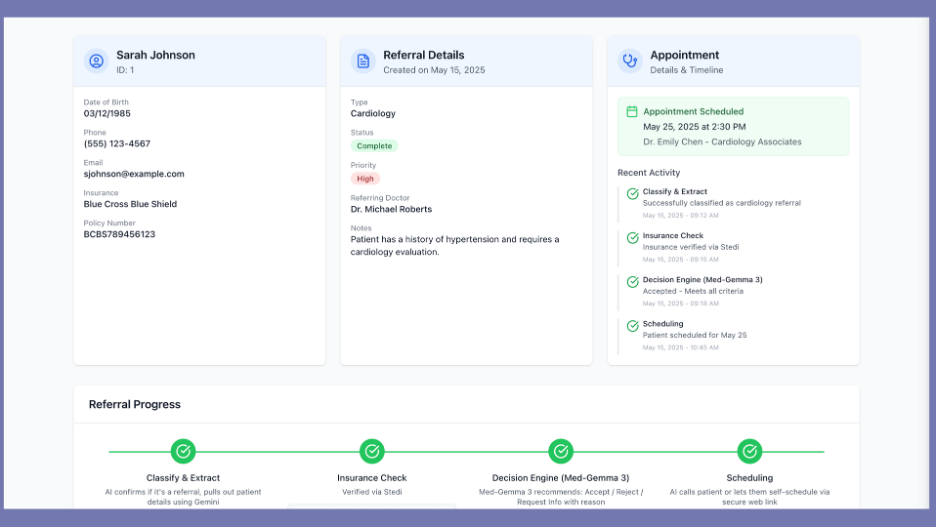
[NK note: One thing cool about this project was seeing how many different components could be stitched together to extract and understand information prior to the visit. There’s APIs to get insurance info, OCR to parse PDFs, models to understand what data is relevant, and then follow up phone calls to clarify things and get even more data.
Collecting info, making sense of info, and figuring out specific next steps feels like a perfect place for generative AI tools]
AdvocateGPT - Making Post-Discharge Easier to Understand for Patient
*Winner: Google HAI-DEF Prize for best project using Google MedGemma
Team: Elias Adhenom, Scott Goldman, Gus Ireland, Karen Jiang, Lucas Wang
Contact Info
- Scott Goldman: Scott@notbadbusiness.com
- Gus Ireland: Augustus.ireland@gmail.com
- Karen Jiang: Kjiang11@gmail.com
- Lucas Wang: Lucas@lucwan.com
Project: AdvocateGPT is an AI-powered patient companion designed to make the patient post-diagnosis experience manageable.
AdvocateGPT helps patients prioritize next steps based on medical advice and after-visit summaries, cutting through medical jargon, bulky discharge packets and more. Patients can interact with AdvocateGPT via voice, SMS, or chat. This tool can also help patients book their next follow-up appointment faster and more easily than the status quo.
Built with FHIR integration, and providing clinical context via Google’s MedGemma models, AdvocateGPT adapts dynamically to symptoms, medications, and care updates. With health literacy principles baked in, it’s like having a doctor in your pocket—ready to translate, coach, and advocate when it matters most.
Live Demo: Watch Here
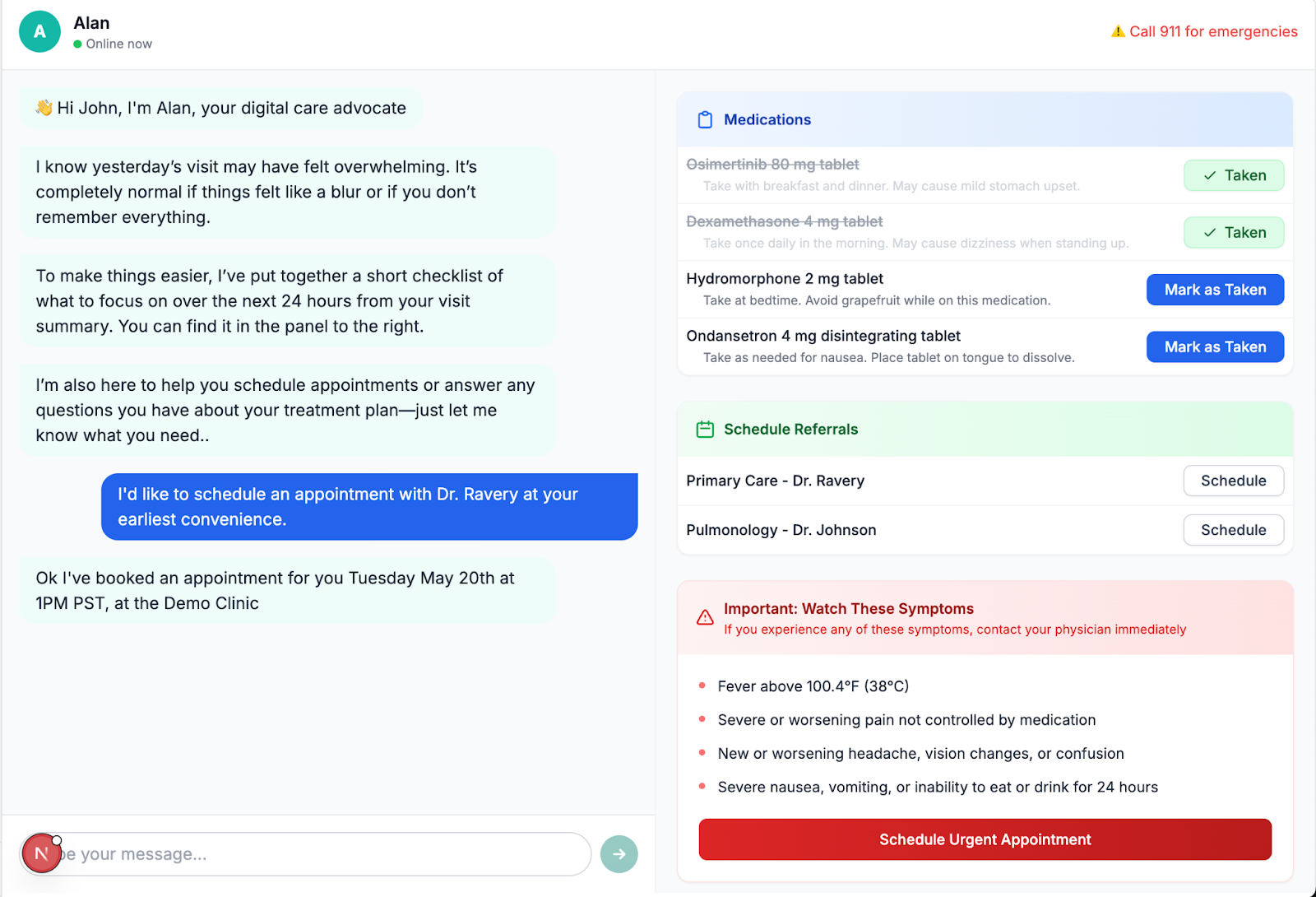
[NK note: Huge patient point, honestly insane if you think about how many things you’re supposed to remember after being given a new diagnosis. Especially considering how much falls on the shoulder of patients to do next in order for the treatment to be successful.
I would also love to see a multiplayer version of this. For example, a shared workspace between me and my parents so I can make sure these things are done/manage the highest importance tasks.]
Clinicians Unchained-- Autonomous Workflow Engine to Reduce Phone Calls
***Winner of the “Damn Son” Award aka. for the application that was most mindblowing + 2nd place People’s Choice Award
Team: Allison Braithwaite, Patrick Damaso, Stefano Leitner, Karsh Pandey
Contact Info:
Project: We built an agentic, tool-enabled workflow execution engine to automate common and frustrating tasks that consume clinician and staff time—starting with unfilled prescriptions. Our agent autonomously makes phone calls to relevant parties (e.g., pharmacies, insurers) to determine why a prescription was denied and follows up with the prescribing clinician only when needed to move it forward.
Rather than relying on pre-defined workflows, the agent takes the next best action based on the information it gathers. It can handle scenarios like drug shortages (notifying the clinician and requesting an alternative) or insurance denials (calling the insurer to understand the issue and relaying it back). The agent runs in the background and surfaces only the minimal, necessary requests to the clinician.
We used the OpenAI Agents SDK to power the workflow logic, Retell for automated phone calls, and Replit to build the UI. Future enhancements include integrating with existing EHR systems, upgrading to a medically specialized model for tasks like drug substitution or interaction checking, and expanding to support additional workflows such as specialist referrals.
Live Demo: Watch Here
Extended Demo: Watch Here
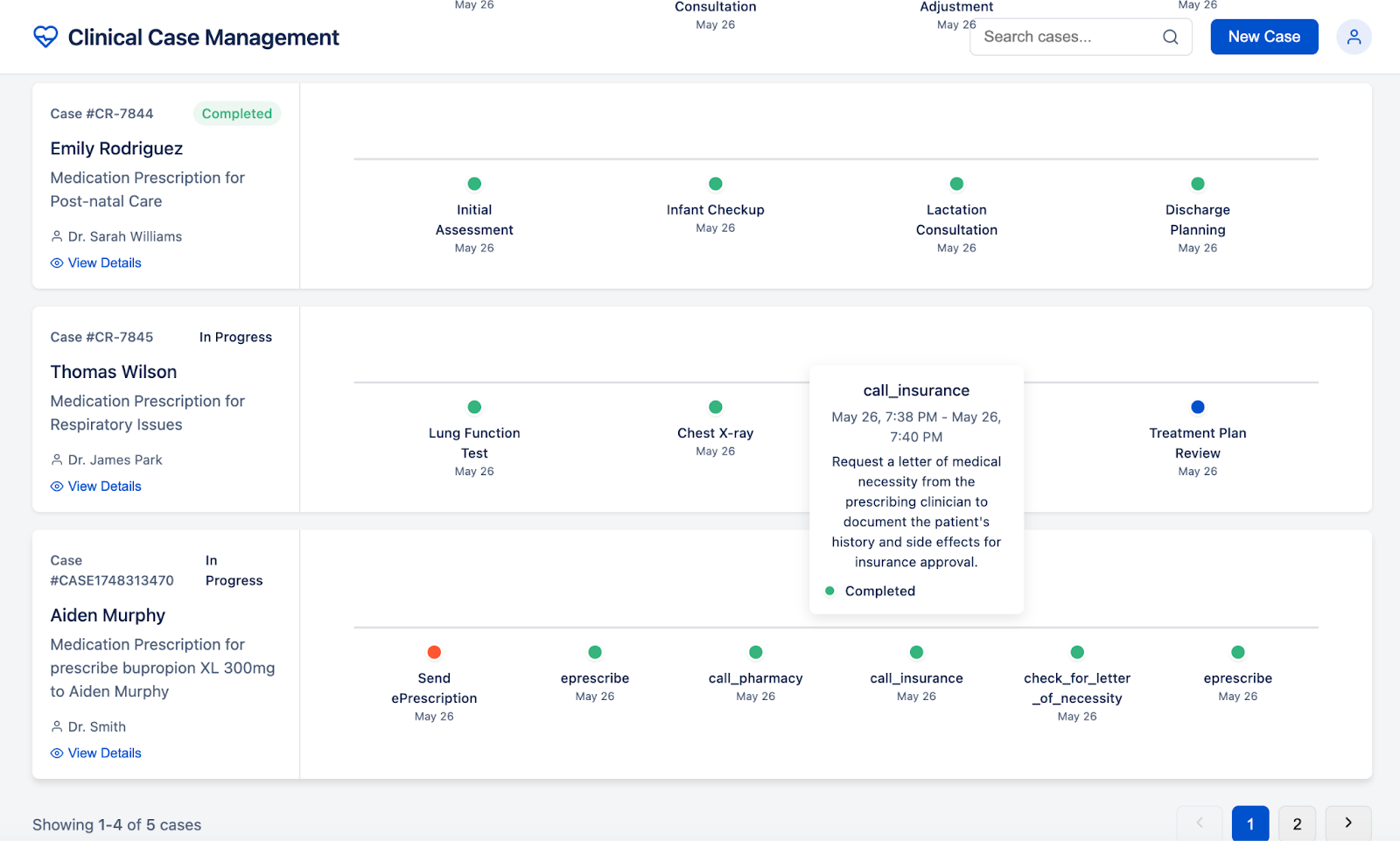
[NK note: You really should watch the demo of this one, it’s pretty crazy. This one showed how useful it is to have multimodal capabilities, low latency models, and reasoning in one as it navigated different phone IVR trees, created documentation, and more WITHOUT A HUMAN NEEDING TO JUMP IN THE LOOP.
Honestly…someone should just build these flows for a personal life. I would pay for an agent chain if it was specific to a flow (e.g. book a restaurant with X characteristics, cancel my WSJ subscription which for some reason requires me listen to three guilt trips from a customer service rep before I cancel). Idk why but it makes me feel like it’s more likely to succeed if it’s specific.]
Sidekick - Your real-time patient advocate in the room
Team: Sam Gorman, Peter Boda, Ashwini Ramamoorthy, Jia Han
Project: Sidekick is a real-time patient advocate designed to support individuals during and after medical appointments. Patients often enter primary care visits burdened by the need to gather relevant information, prepare questions, and advocate for themselves, all without knowing what recommended treatments will actually cost. This can result in rushed, disconnected interactions and leave patients feeling confused or disempowered. Sidekick helps bridge this gap by passively listening during the appointment, capturing key information, and generating structured notes. It clarifies complex medical language, suggests timely follow-up questions, and, when prompted, surfaces real-time cost estimates tailored to the patient's context.
By reducing the cognitive load of navigating care in the moment, Sidekick enables patients to stay more present and engaged. After the visit, it provides a clear summary of what was discussed and helps organize actionable next steps, such as follow-up questions or tasks. By promoting transparency and shared decision-making, Sidekick helps turn fragmented healthcare encounters into more focused patient-centered experiences.
Live Demo: Watch Here
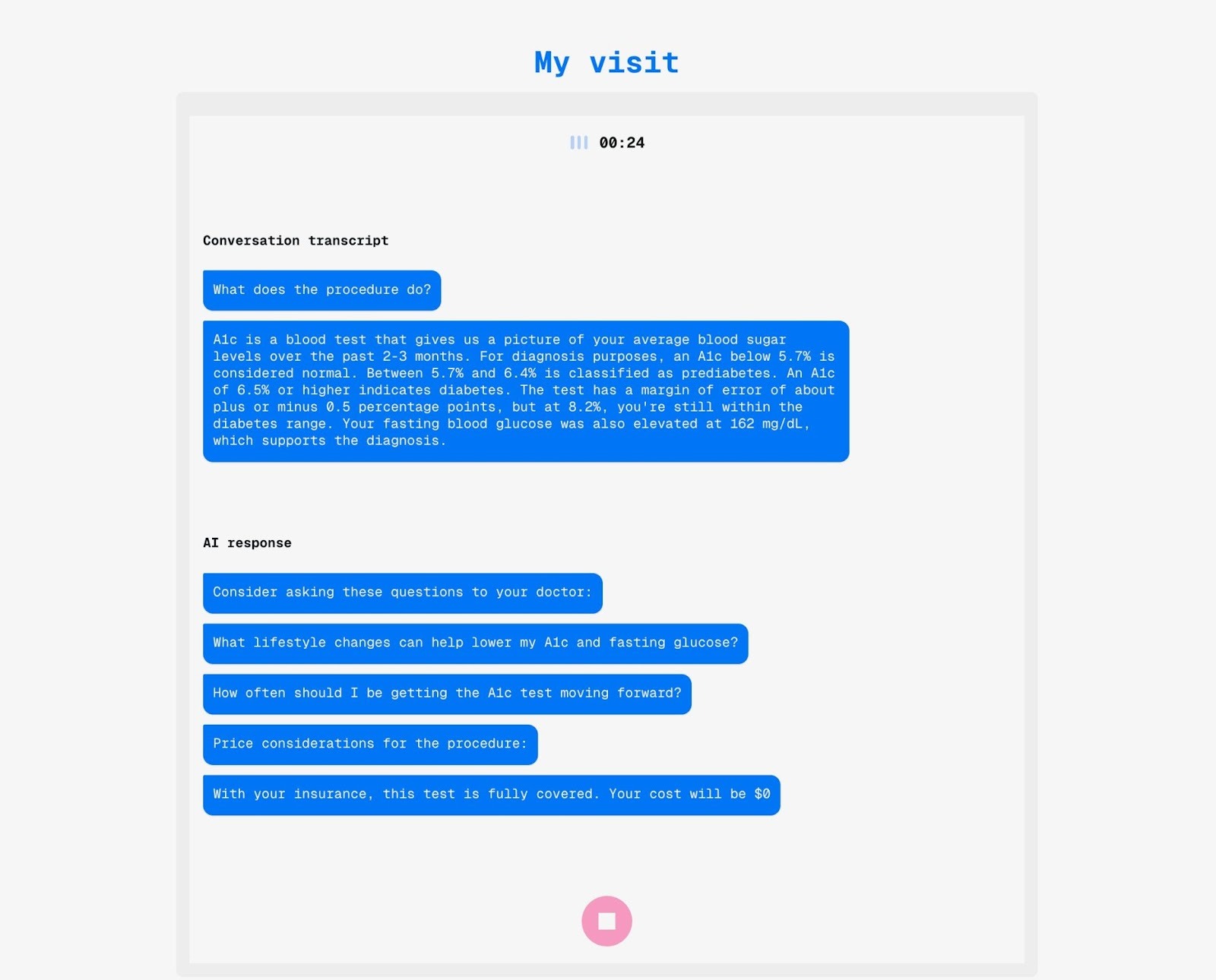
[NK note: There’s a lot of scribes out there, but they're all in service of the provider. I like the idea of a scribe that’s in service of the patient, acting as a mini doctor in your pocket during a visit. It’s like having a physician spouse in the room who knows what follow up questions to ask right there.
I think this is particularly interesting if you can actually get the insurance coverage details with you, so when a doctor orders follow up labs/prescriptions etc, you can have a conversation about alternatives right there if it’s not covered.]
DRY Health - Social shareable health record
Team: Erik Dungan, Kyle Munkittrick, Jung Hoon Son, M.D., Sanal Buvaev
Contact: If you want to yell at someone for how absurd this idea is and learn why you're wrong, you can hit Kyle up at kmunkitt@gmail.com or @popbioethics on X.
Project: No matter how ‘private’ health seems, we spend a lot of our time texting, discussing, and posting about it. It should be easier for you to share YOUR story. DRY health interviews you (or just listening to you rant) about your health journey. It saves YOUR version of YOUR health story so that you can share it with whomever you want!
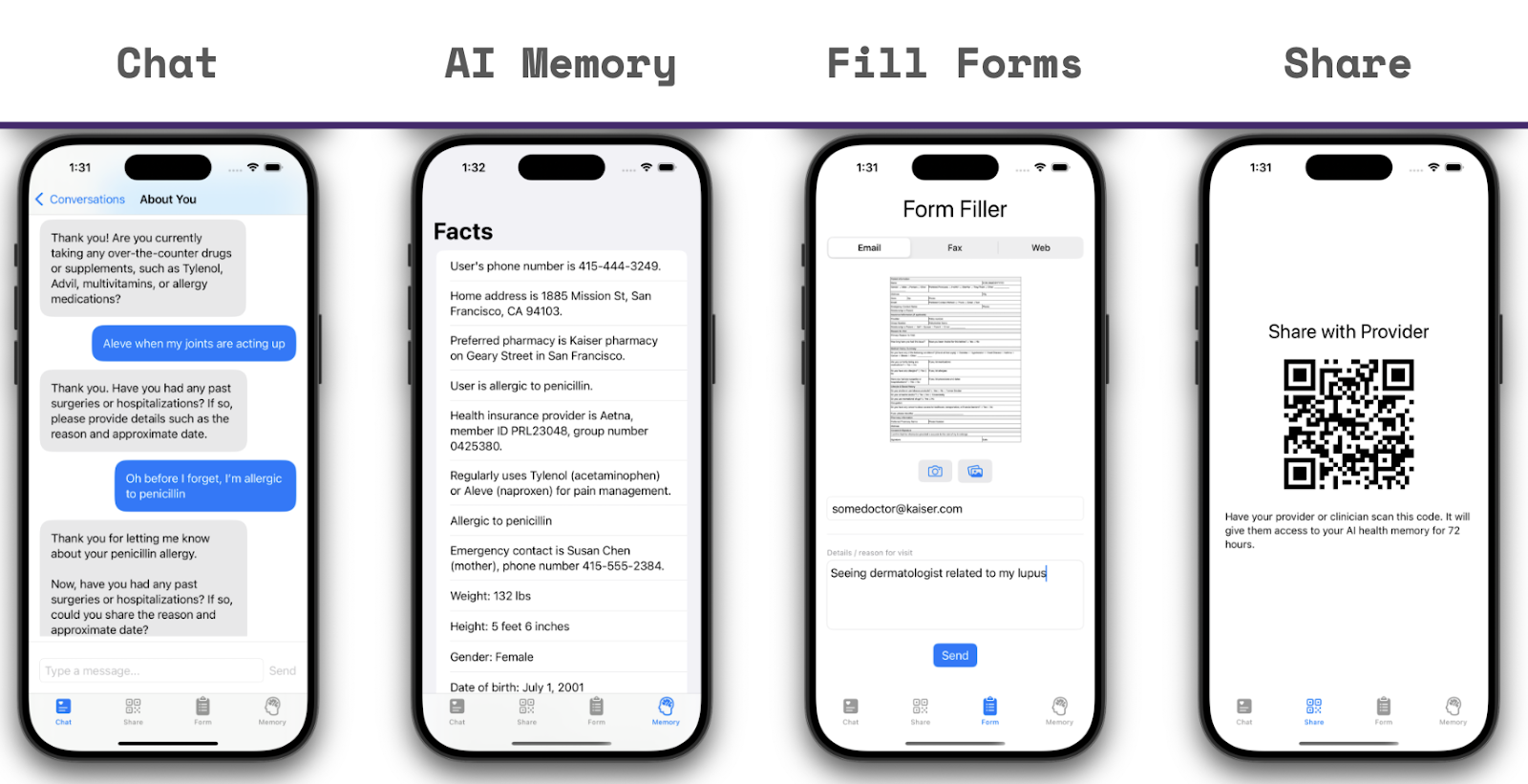
DRY Health makes it easy to re-tell your story as it changes. Fill forms? Sure! Text the group threads an update? Easy. Posting on Reddit about some weird side effects? A few clicks. Want to create a TikTok series of your journey? Done. Or maybe you want to do whatever this would be:

Can't do that with a normal EHR! But you could with DRY Health. DRY Health lets you share your journey, your way, without HIPAA or the healthcare system standing in your way. Get your story out there without repeating yourself.
Live Demo: Watch It Here
[NK note: If anyone wants to talk to me about anything and also learn why you’re wrong, I’m also available.
This is one of the cooler uses of chatGPT memory. The idea that you can chat with a bot and it will hold details on your current status of things is really useful. Then when you need to fill forms out, it can use context from your chat history to fill those forms out on your behalf.
Filling out forms actually does feel like an interesting wedge into building a personal health record (an infamously tried and failed startup idea). I love the idea creating a QR code to quickly share the relevant health information from past chats with whoever you want, that’s really nifty and probably useful in lots of contexts.]
Carely - Caregiver (Enhanced) To-do Lists
Team: Kerry Weinberg, Kate Dorrer, Sanam Ghazvini
Project: Millions of Americans rely on remote caregivers to support aging or chronically ill loved ones, yet these caregivers often lack tools to stay connected with clinical care teams. We built Carely, an EHR-integrated tool designed to streamline caregiver task management by embedding directly into a health system or provider’s patient portal. By surfacing shared task lists, real-time updates, and patient context in one place, Carely helps bridge the gap between clinical care and day-to-day caregiving at home.
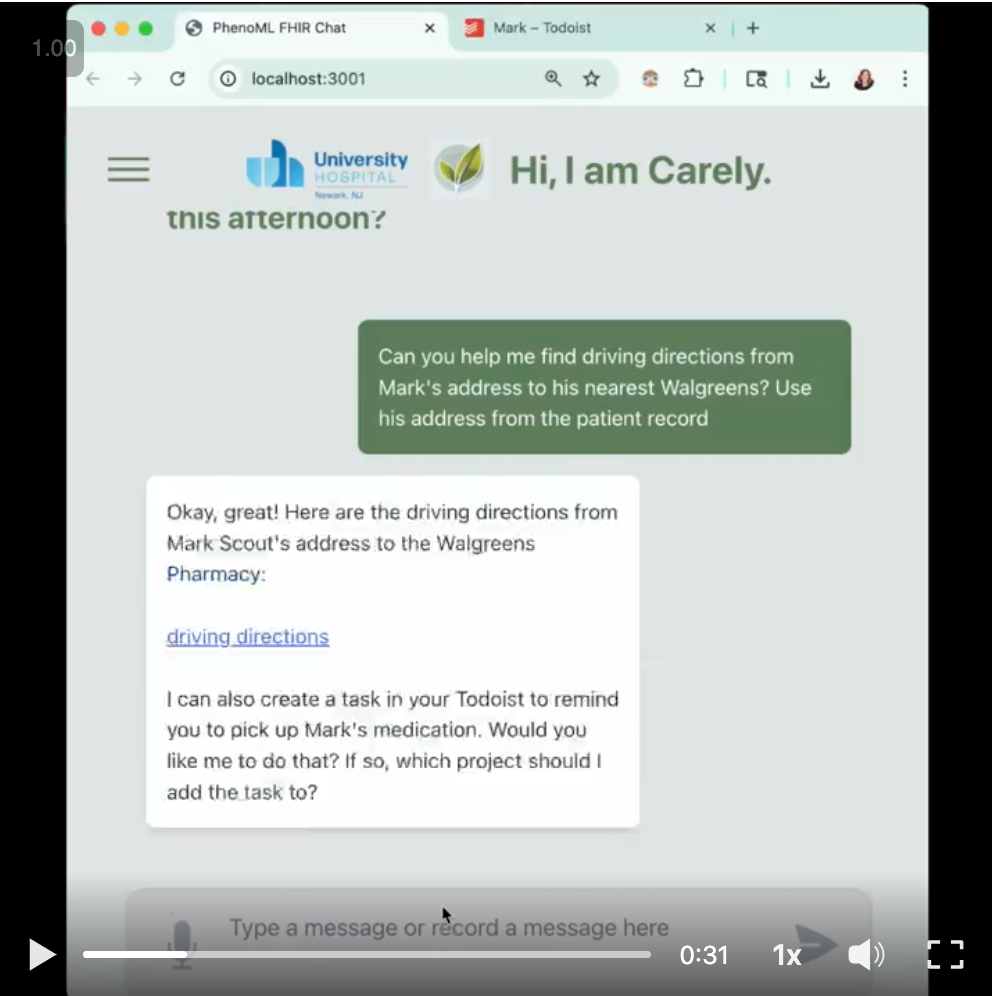
In our demo, Carely uses Google ADK and PhenoML APIs to enable AI-powered workflows within platforms like Medplum and Canvas Medical. It connects with Google Maps for logistics and Todoist for task management, making it easy for providers to assign and track caregiver responsibilities. By embedding Carely in the tools providers already use, we’re aiming to reduce caregiver burnout, improve care coordination, and show how quickly healthcare AI agents can be deployed using PhenoML.
Live Demo: Watch here
Recorded Demo: Watch Here
[NK note: The idea of agents that use patient data from the EHR to help you interact with the real-world is super cool. You can imagine a world in which it’s a one-touch click based on info in your EHR, the caregiver can get the prescription sent, order groceries via Instacart, and make the next appointment.
So many agents to do things, the Matrix never told me they would be the protagonist??]

CliniCall - Voice Calls To Find In Network Care
Team: Terry Lin, Jeff Liu, Mike Wang, Kanon Mori
Contact Info:
- Terry Lin: Terry95193@gmail.com
- Kanon Mori: kanon76@ucla.edu
Project: Navigating health insurance and booking a doctor’s appointment shouldn’t require a degree in healthcare—or hours on the phone. Yet for millions of people, especially immigrants and those unfamiliar with the system, it’s a frustrating and confusing process.
CliniCall solves this by making it radically simple: just enter your insurance policy number, zip code, preferred timeframe, and symptoms. In one click, CliniCall returns a list of in-network providers near you who are accepting new patients and available when you need them.
Behind the scenes, CliniCall uses Google’s MedGemma model to analyze symptoms and match you to the right type of clinician. It checks your insurance details to identify in-network providers—and even deploys AI-powered calling agents to contact those offices directly and confirm appointment availability.
Live Demo: Watch here
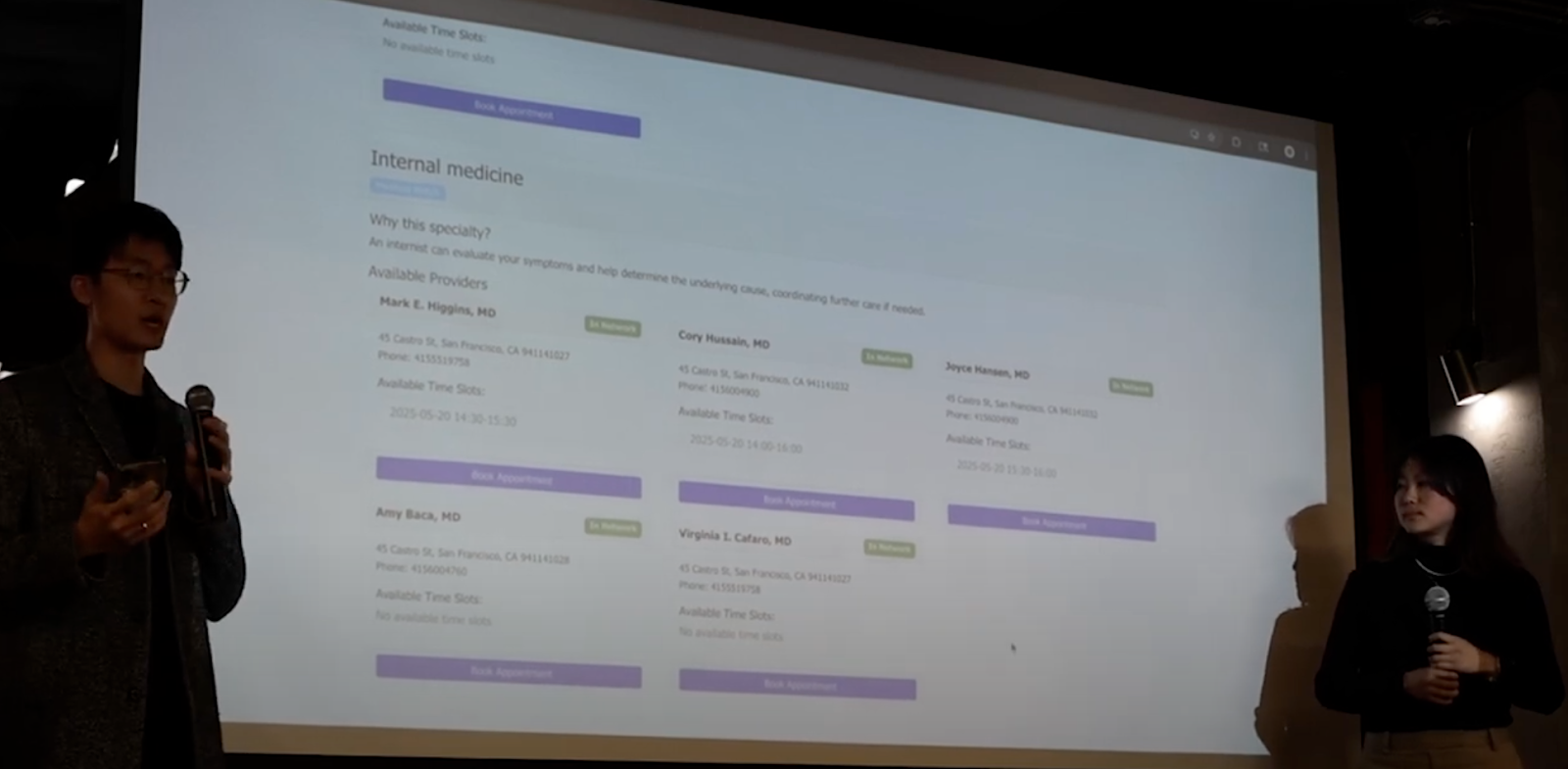
[NK note: That you can run so many calls in parallel now is both awesome because you can get answers quicker, and terrifying because we’re gonna DDOS the front office of every company. Maybe that’ll force them to get a bot on the other side to answer quickly.
It seems to me you could run this like once a month and do a better job building a provider directory database vs. trying to backwards figure this out through claims data].
Medi-Triage: Sorting The Physician Inbox by Importance
Team: James Xu, Maria Bobbett, David Van Story
Contact Info:
- d.vanstory01@gmail.com
- mbobbett@gmail.com
- kchenjs@gmail.com
Physicians are inundated with hundreds of digital messages from patients every day, ranging from simple logistical questions (“Where is your office?”) to potentially critical concerns (“I’m experiencing sudden chest pain”). Manually sifting through and prioritizing this volume of messages is a significant cognitive and administrative burden and there is a risk that urgent cases may be delayed or overlooked amongst the routine inquiries.
Medi-Triage Solution: An AI triage system that automatically reviews incoming patient messages, classifies them according to a clinically validated urgency protocol, and flags high-priority items for attention. By handling the initial assessment and separating urgent from non-urgent cases, the AI tool enables doctors to focus their time on patients in greatest need, improving their workflow and enhancing patient safety.
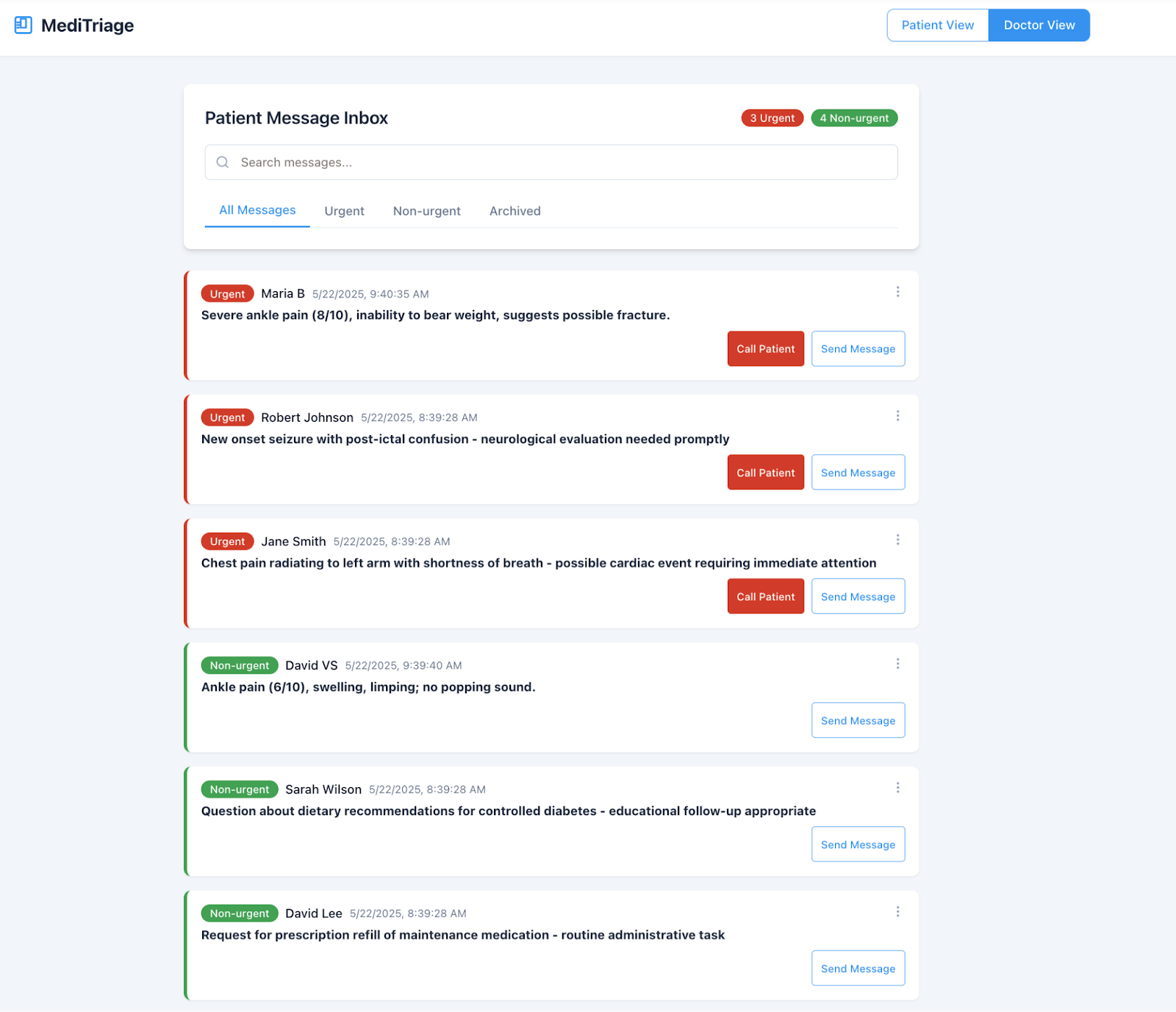
Live Demo: Watch Here
Extended Demo: Watch Here
[NK Note: Here’s my mistake. We tried to get two engineers for every team. I did not realize both engineers on this team were hardware engineers. Apparently that means they’re basically as technically illiterate as I am (jk, sort of).
This is more of a testament to the vibe coding tools that with very little software engineering experience this team was able to build such an impressive demo in 36 hours!
It makes me think for something like inbox management, it soon won’t be too hard for individual docs/practices to essentially build their own versions of this with their own rules about what they want to be escalated.]
WeNome - Talk To Your Genome! Get Answers!
Team: Albert Cai, Colin DuRant, Nathan H. Leung, Ramraj Velmurugan
Contact: wenome.oop@gmail.com
Project: WeNome is an interactive chat platform that lets users explore their genomic data through natural language. Powered by Anthropic and a custom set of open source genomic reference databases including PharmCAT and SNPedia, WeNome turns a VCF file into a dynamic source of personalized insights. Users can ask questions like “Will I respond well to this medication?” or “Do I have markers for lactose intolerance?” and receive tailored, evidence-based responses derived from their own genetic code.
WeNome intelligently routes queries to the appropriate tools, retrieves relevant data, and synthesizes responses in a conversational format. When configured, it can also connect directly to a provider’s inbox using the Canvas EHR API—enabling seamless, user-initiated genomic communication in clinical workflows. As genome sequencing becomes ubiquitous, WeNome imagines a world where understanding your DNA is as easy as asking a question.
Live Demo: Watch Here
Recorded Demo: Watch Here
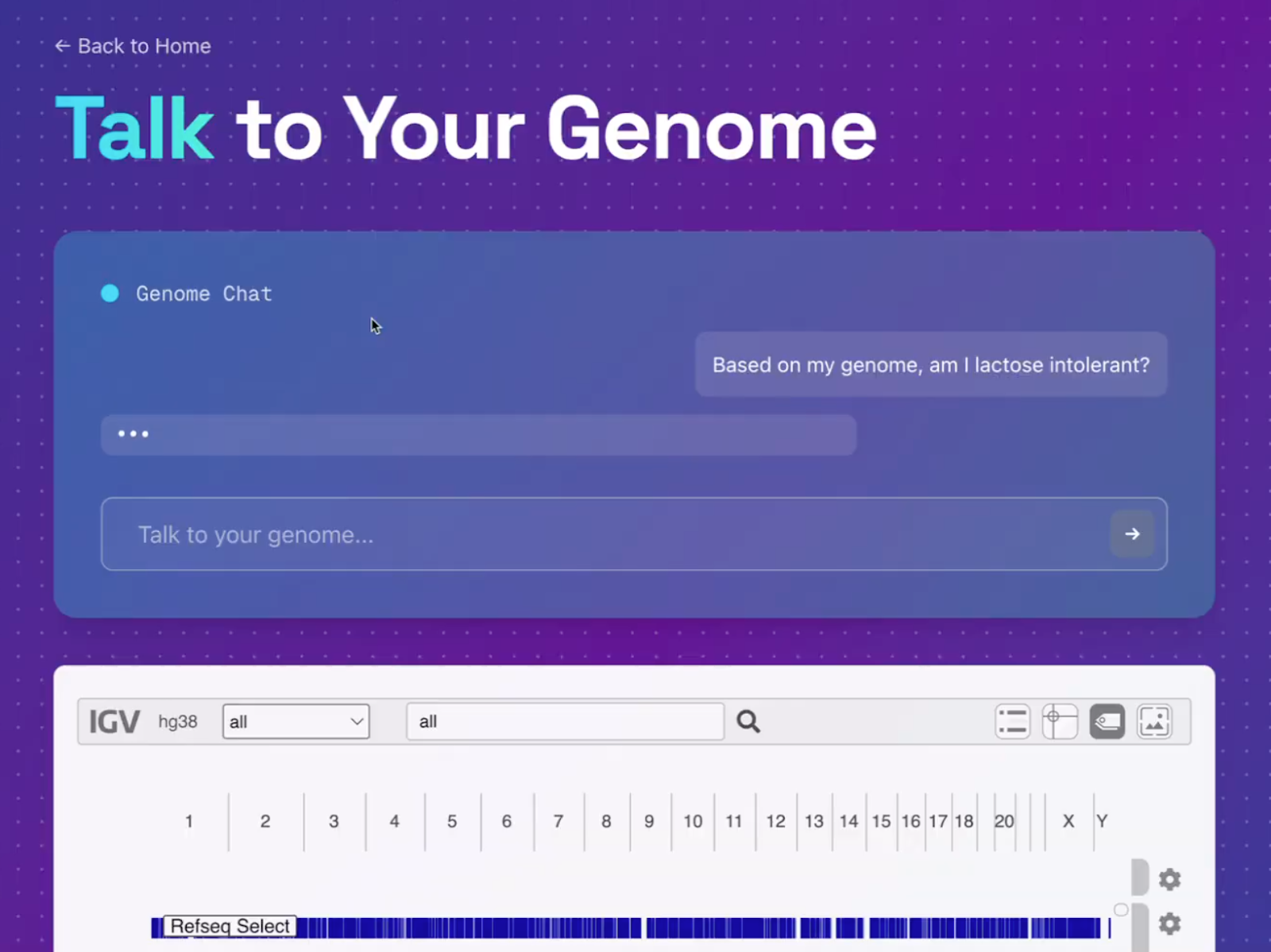
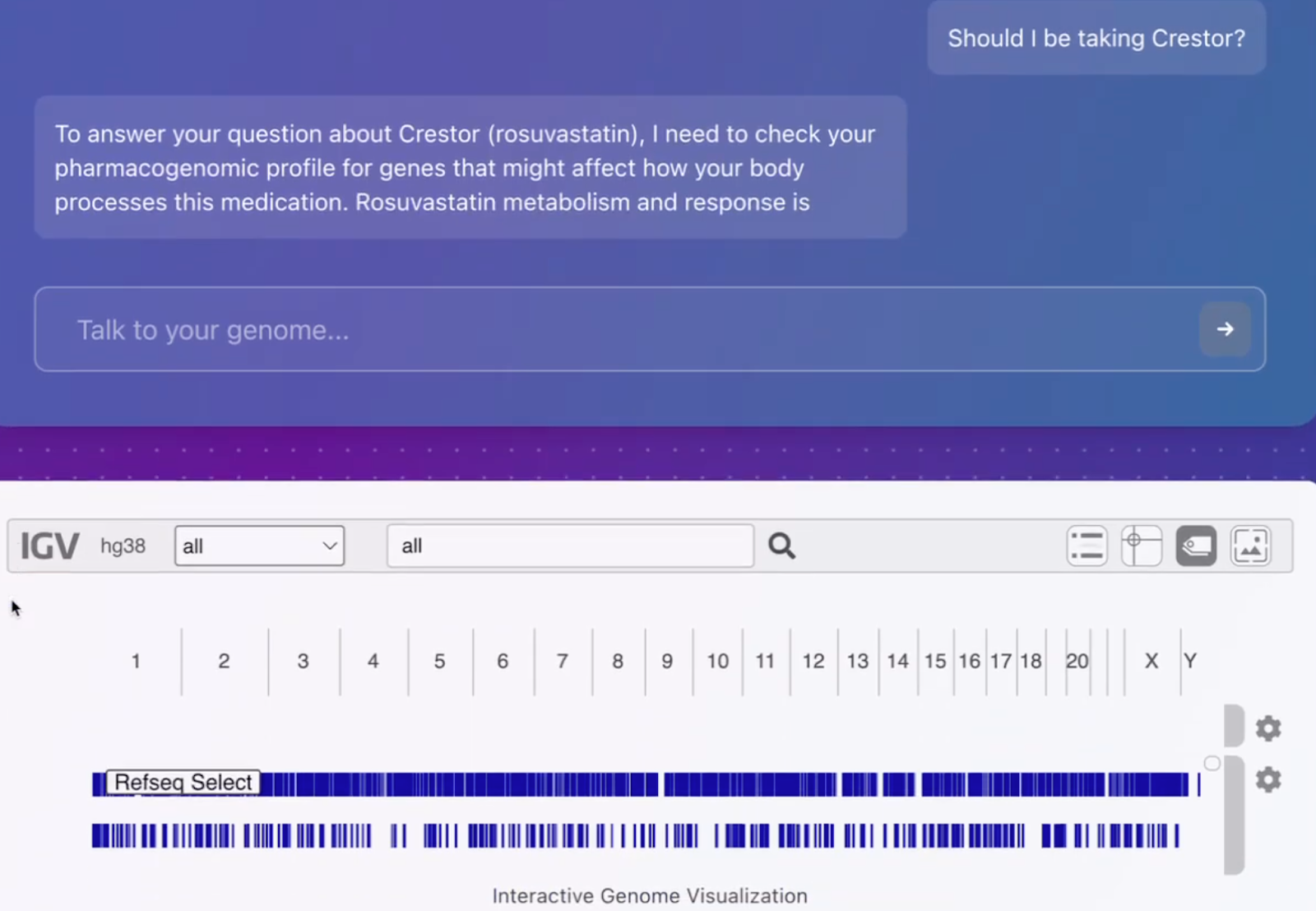
[NK note: I thought this was a very underrated project in the hackathon. I love that you can go really deep into different genes if you’re curious and understand how it might affect you. This lowers the barrier immensely to answering simple questions like “is it okay if I take this drug” or “is ‘having that dog in me’ a heterozygous dominant mutation”? I think pharmacogenetics is really underutilized, and maybe having a patient-directed version of it will be an unlock.
It was interesting talking to this team and seeing all the different open-source reference libraries they worked with, but how hard it was to actually make them useful. They said it was 10 hours to get the libraries to work, and then 1 hour to actually push it to Canvas. The pro and con of open-source, it’s free but there’s not a ton of incentive to maintain or make it usable.]
U Good? A Personal Health Assistant
Team Mishaal Ali, Max Zavyalov, Geoff Schwarten, Surya Kasturi, Kristin Manley
Contact: Mishaalali100@gmail.com
Project: U good? is your personal health assistant—an intelligent agent that manages your care from end to end. It keeps you informed, simplifies your next steps, and empowers you to take control of your health with ease. By cross-analyzing your medical records, insurance coverage, and evidence-based guidelines, it creates a clear, personalized care plan just for you. Whether it’s screenings, vaccines, or follow-ups, you’ll know exactly what’s due—and what’s covered.
And when you're ready to act, U good? handles it. You can schedule appointments with a click—no portals, no phone trees, no confusion. Just answers, action, and peace of mind.
Live Demo: Watch Here
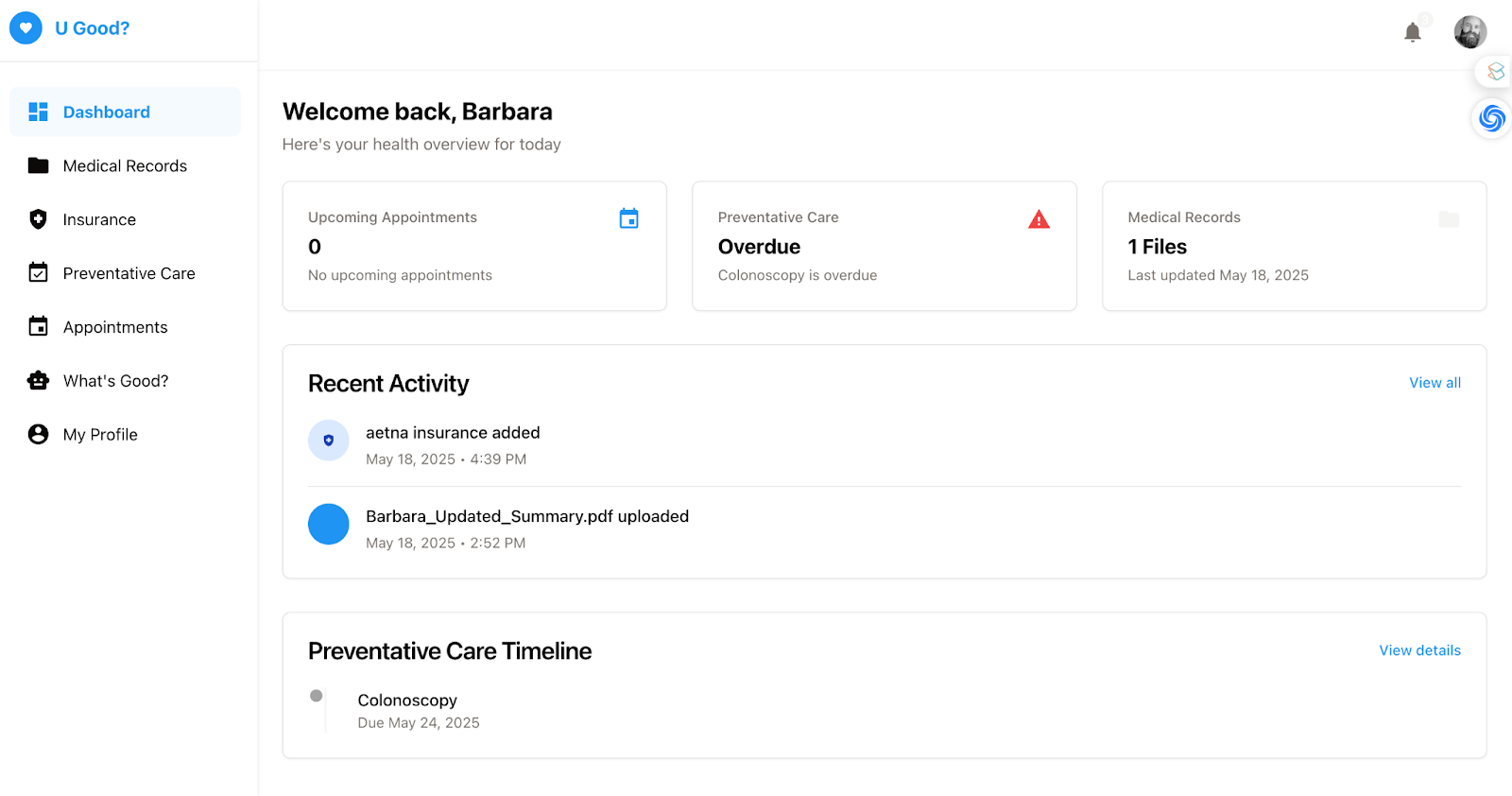
[NK note: Best branding for sure. I like the “What’s good?” diagnostic bot.
You should get a notification that says “aight” when you’re done with your tasks]
Conclusion, Parting Thoughts, and Sponsors
I love doing hackathons, they feel optimistic when the rest of healthcare feels cynical and incremental.
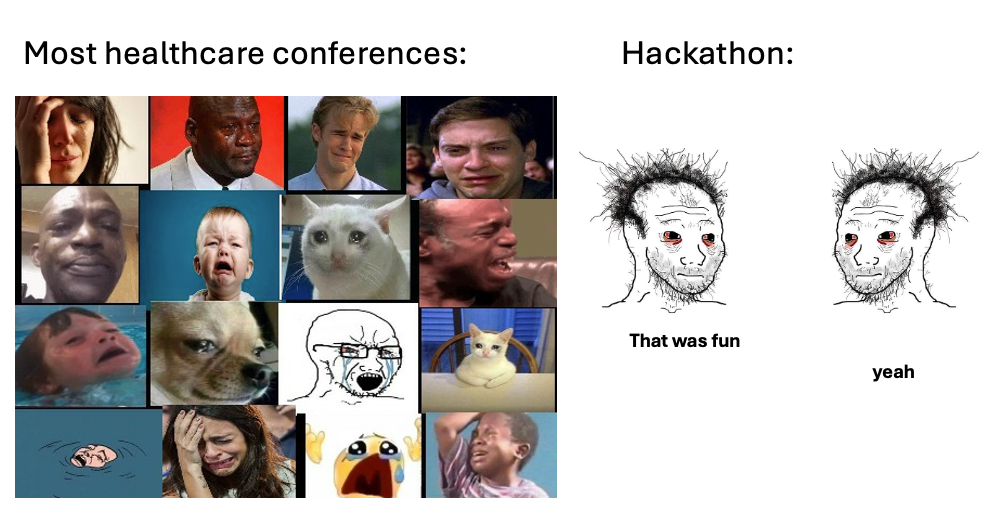
We’re going to be doing more in the future (hardware, gamification, pediatrics, and more). If that sounds like something you’d want to be a part of, sign up here to get notified.
One of the cool parts about doing this hackathon is that we got a ton of real awesome tools and sponsors for this. In particular want to shoutout our higher tier sponsors who were tools people built with and were on site to build with hackers:
- Canvas - Whether you’re vibe coding or carefully engineering, build your hackathon project with Canvas developer tools. Canvas is the most programmable EMR on earth so you can accelerate anything: notes, orders, scheduling, claims, and payment workflows.
- Vanta - As a healthcare startup, you understand the critical importance of security and compliance. Vanta is the trust management platform that helps healthcare companies go from zero to compliance with ease, enabling you to build customer trust from the start and focus on scaling your business. With 35+ pre-built frameworks including SOC 2, HIPAA, and HITRUST and 375+ integrations, we simplify compliance.
- Google - Google’s Health AI Developer Foundations (HAI-DEF) is a suite of open weight models to help developers more easily build AI models for healthcare applications. HAI-DEF includes embedding models for chest X-rays, pathology, dermatology and bioacoustics, as well as generative LLM-based models for drug discovery and clinical healthcare (new!)
- Stedi - Stedi is a modern, API-first healthcare clearinghouse. We provide a collection of developer friendly APIs for running eligibility and benefit verification checks and processing claims with thousands of insurance payers across medical and dental. Stedi’s APIs allow healthcare technology businesses to automate revenue cycle workflows without relying on legacy EDI file formats and protocols.
- Abridge - Abridge was founded in 2018 with the mission of powering deeper understanding in healthcare. Supported by Linked Evidence, Abridge is the only solution that maps AI-generated summaries to source data, helping clinicians quickly trust and verify the output.
If you want to sponsor or work with us on a future hackathon, hit us up.
And with that, huge congrats to this year’s AI healthcare hackathon participants. I hope you had as much fun as I did 🙂
Thinkboi out,
Nikhil aka. “Hackathon, thon thon thon thon. Look in your eye so devilish…”
Twitter: @nikillinit
IG: @outofpockethealth
Other posts: outofpocket.health/posts
--
{{sub-form}}
If you’re enjoying the newsletter, do me a solid and shoot this over to a friend or healthcare slack channel and tell them to sign up. The line between unemployment and founder of a startup is traction and whether your parents believe you have a job.
Healthcare 101 Starts soon!
See All Courses →Our crash course teaches the basics of US healthcare in a simple to understand and fun way. Understand who the different stakeholders are, how money flows, and trends shaping the industry.Each day we’ll tackle a few different parts of healthcare and walk through how they work with diagrams, case studies, and memes. Lightweight assignments and quizzes afterward will help solidify the material and prompt discussion in the student Slack group.
.png)
Healthcare 101 Starts soon!!
See All Courses →Our crash course teaches the basics of US healthcare in a simple to understand and fun way. Understand who the different stakeholders are, how money flows, and trends shaping the industry.Each day we’ll tackle a few different parts of healthcare and walk through how they work with diagrams, case studies, and memes. Lightweight assignments and quizzes afterward will help solidify the material and prompt discussion in the student Slack group.
.png)
Healthcare 101 starts soon!!
See All Courses →Our crash course teaches the basics of US healthcare in a simple to understand and fun way. Understand who the different stakeholders are, how money flows, and trends shaping the industry.Each day we’ll tackle a few different parts of healthcare and walk through how they work with diagrams, case studies, and memes. Lightweight assignments and quizzes afterward will help solidify the material and prompt discussion in the student Slack group.
.png)
Healthcare 101 starts soon!
See All Courses →Our crash course teaches the basics of US healthcare in a simple to understand and fun way. Understand who the different stakeholders are, how money flows, and trends shaping the industry.Each day we’ll tackle a few different parts of healthcare and walk through how they work with diagrams, case studies, and memes. Lightweight assignments and quizzes afterward will help solidify the material and prompt discussion in the student Slack group.
.png)
Interlude - Our 3 Events + LLMs in healthcare
See All Courses →We have 3 events this fall.
Data Camp sponsorships are already sold out! We have room for a handful of sponsors for our B2B Hackathon & for our OPS Conference both of which already have a full house of attendees.
If you want to connect with a packed, engaged healthcare audience, email sales@outofpocket.health for more details.







